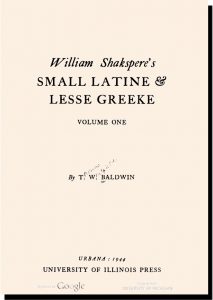April 4, 2018 — Steven Steinburg, who recently demolished Sir Jonathan Bate’s arguments in an authorship debate, now takes on the myth of the Stratford Grammar School in “Fake Truth & The Language of Professional Scholarship,” published on the SOF website.

The grammar school myth is largely based on T.W. Baldwin’s massive, two-volume work, William Shakspere’s Smalle Latine and Lesse Greeke, published in 1944. Baldwin attempted to explain the vast book-learning evident in Shakespeare’s plays by demonstrating that the Stratford glover’s son would have gotten all the literary training he needed at his local grammar school (assuming that he went there, an unproven assumption) because that’s where the literary training was done in those days, not in the universities!
Baldwin argued that the 16th century grammar school curriculum was highly organized and had been standardized into essential uniformity. Baldwin’s work has been uncritically adopted by Stratfordians ever since, up to and including the defensive Stratfordian manifesto, Shakespeare Beyond Doubt: Evidence, Argument, Controversy, edited by Edmondson and Wells (2013).
Steinburg shows that Baldwin is mostly balderdash. Actual lists of books used in different grammar schools show no uniformity and, indeed, very little overlap. The town of Rotherham, which was much larger, wealthier, and more significant than Stratford, only used five literary texts for grammar school. Is it logical to assume that Stratford somehow had more? Steinburg also subjects to scathing scrutiny the gushing theory that rote learning under the threat of a thrashing somehow developed prodigious memories of literary classics in young boys.
All in all, Steinburg notes, the weakness of Baldwin’s theories and their unquestioning acceptance by Stratfordian scholars bring into doubt the methods and the integrity of what is known as “professional Shakespeare scholarship.”
You can read Steinburg’s article here.


